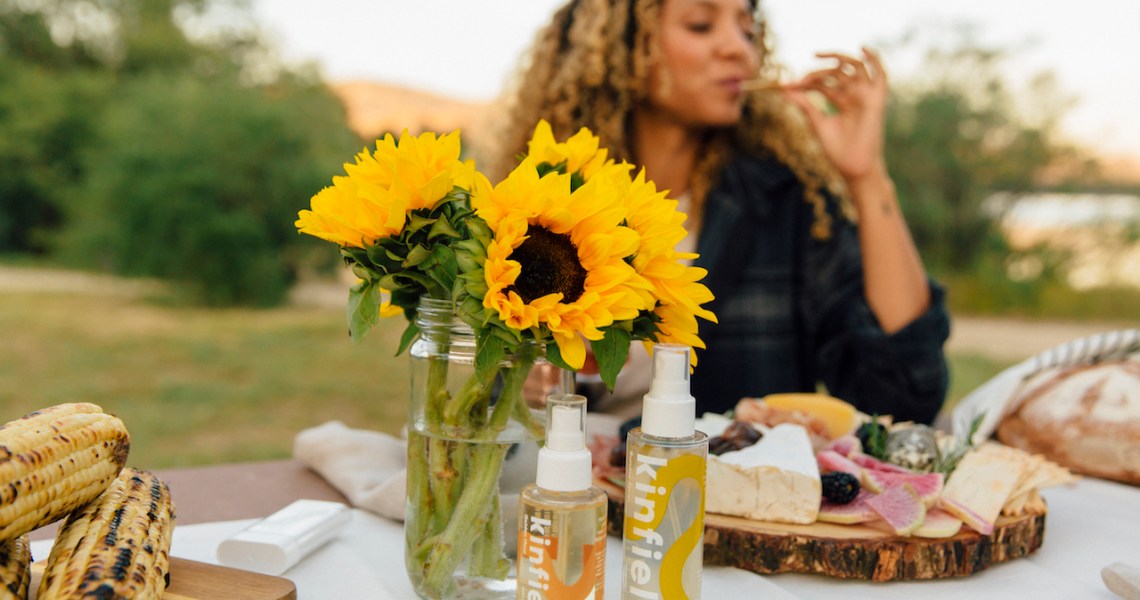As once-forgotten categories like sexual wellness and deodorant increasingly land in beauty retailers like Ulta, the lines between the beauty and personal-care categories continue to blur. Nascent, direct-to-consumer brand Kinfield hopes to ride that wave with its assortment of outdoor sprays and moisturizers.
On June 26, Kinfield debuted exclusively on Kinfield.com with a lineup of bug repellent, aloe spray and a moisturizing balm; all products retail from $18 to $22. The brand uses clean ingredients and has an Outdoor Voices-esque packaging, marketing and social aesthetic. Founder and CEO Nichole Powell, who cut her teeth at DTC fashion brand Modern Citizen, hopes to bring the wellness conversation to the outdoor, personal-care segment.
“The products I used growing up camping in Minnesota, like aerosol cans of repellent and that big, green bottle of aloe spray, have not grown up. I was using all of these very considered and clean products for my skin care, but no better options had come through for this part of the personal-care conversation,” said Powell.
The bug-spray market is certainly considered an unsexy category and dominated by players like Off, which is part of private company S. C. Johnson & Son’s portfolio. According to market research firm IRI Worldwide, Off generated over $167 million in sales in the last 52 weeks. There’s also Repel, which is owned by Spectrum Brands and the No. 1 player in the outdoor insect segment. It categorizes its personal-care product in the home and garden sector, alongside its Black Flag and Spectracide lawn sprays, a far cry from beauty and wellness products. Spectrum Brands’s repellent category accounts for 24% of its category sales, though sales fell $6.2 million in 2018 due to slower seasonal weather.
Meanwhile, the after-sun category, which is expected to grow by over 2% to $71 million in retail sales by 2023, according to market research firm Euromonitor International, is equally dominated by tired brands. Thirty-seven-year-old Banana Boat and 58-year-old Hawaiian Tropic, both owned by Edgewell, which recently acquired Harry’s, rank No. 1 and No. 2 in the category.
“Beauty, personal care and wellness are incredibly crowded spaces right now, so it’s hard to find true white space out there, but Kinfield is genuinely disruptive because there has been no innovation from the stodgy legacy brands in this arena,” said Tina Bou-Saba, founder of CXT Investments, who is an investor in Kinfield and other clean brands like fragrance company Ellis Brooklyn and clean color cosmetics brand Kosas.
Though the barriers of entry for beauty and personal-care brands are lower than ever, customer acquisition costs are incredibly high. Much bigger digital-native brands, such as 4-year-old Native, are shifting their ad dollars away from Facebook and Google toward television and podcasts. For now, Kinfield is not going the digital ad or paid-influencer route for launch but is instead using its marketing budget to gift products to select influencers and tastemakers. CEO Powell hopes to eventually sell in unconventional retail channels, like Showfields and select pop-ups. For its debut, Kinfield gifted 100 launch kit boxes comprised of the aforementioned products, a baseball cap and a water bottle. It plans to repeat this gifting exercises multiple times over the course of the summer.
Ad position: web_incontent_pos1
“We want to let the virality of these types of products grow before we think of retail as a customer acquisition channel. The benefit of these products is that you do use them with people, at a camping trip or a barbecue or on a hike, so there is a natural shareability, just like with an Outdoor Voices or an Away,” said Powell.
Bou-Saba added, “We want to first let the stickiness of this community grow, much like other modern brands, and that’s through social and word of mouth.”


